Practical Evaluation Guide
American Association for State and Local History
Book Series
Series Editor: Russell Lewis, Chicago History Museum
Editorial Advisory Board
Anne W. Ackerson, Leading by Design
William Bomar, University of Alabama Museums
Jessica Dorman, The Historic New Orleans Collection
W. Eric Emerson, South Carolina Department of Archives and History
Tim Grove, National Air and Space Museum
Ann E. McCleary, University of West Georgia
Laurie Ossman, Preservation Society of Newport County
Laura Roberts, Roberts Consulting
Sandra Smith, Heinz History Center
Kimberly Springle, Charles Sumner School Museum and Archives
William S. Walker, Cooperstown Graduate Program, SUNY Oneonta
Staff
Bob Beatty, AASLH
Charles Harmon, Rowman & Littlefield Publishers
About the Series
The American Association for State and Local History Book Series addresses issues critical to the field of state and local history through interpretive, intellectual, scholarly, and educational texts. To submit a proposal or manuscript to the series, please request proposal guidelines from AASLH headquarters: AASLH Editorial Board, 1717 Church St., Nashville, Tennessee 37203. Telephone: (615) 320-3203. Website: www.aaslh.org.
About the Organization
The American Association for State and Local History (AASLH) is a national history membership association headquartered in Nashville, Tennessee. AASLH provides leadership and support for its members who preserve and interpret state and local history in order to make the past more meaningful to all Americans. AASLH members are leaders in preserving, researching, and interpreting traces of the American past to connect the people, thoughts, and events of yesterday with the creative memories and abiding concerns of people, communities, and our nation today. In addition to sponsorship of this book series, AASLH publishes History News magazine, a newsletter, technical leaflets and reports, and other materials; confers prizes and awards in recognition of outstanding achievement in the field; supports a broad education program and other activities designed to help members work more effectively; and advocates on behalf of the discipline of history. To join AASLH, go to www.aaslh.org or contact Membership Services, AASLH, 1717 Church St., Nashville, TN 37203.
Practical Evaluation Guide
Tools for Museums and Other Informal Educational Settings
Third Edition
Judy Diamond, Michael Horn, and David H. Uttal
ROWMAN & LITTLEFIELD
Lanham Boulder New York London
Published by Rowman & Littlefield
A wholly owned subsidiary of The Rowman & Littlefield Publishing Group, Inc.
4501 Forbes Boulevard, Suite 200, Lanham, Maryland 20706
www.rowman.com
Unit A, Whitacre Mews, 26-34 Stannary Street, London SE11 4AB
Copyright 2016 by Rowman & Littlefield
All rights reserved . No part of this book may be reproduced in any form or by any electronic or mechanical means, including information storage and retrieval systems, without written permission from the publisher, except by a reviewer who may quote passages in a review.
British Library Cataloguing in Publication Data
Library of Congress Cataloging-in-Publication Data Available
Names: Diamond, Judy, author. | Horn, Michael (Michael Stephen) author. | Uttal, David H. (David Henry), 1960 author.
Title: Practical evaluation guide : tools for museums and other informal educational settings / Judy Diamond, Michael Horn, and David H. Uttal.
Description: Third edition. | Lanham : Rowman & Littlefield, 2016. | Series: American Association for State and Local History | Includes bibliographical references and index.
Identifiers: LCCN 2015042901 (print) | LCCN 2015046192 (ebook) | ISBN 9781442263536 (cloth : alk. paper) | ISBN 9781442263543 (pbk. : alk. paper) | ISBN 9781442263550 (Electronic)
Subjects: LCSH: Museum exhibitsEvaluation. | MuseumsEducational aspects. | Non-formal education.
Classification: LCC AM151 .D5 2016 (print) | LCC AM151 (ebook) | DDC 069/.5dc23 LC record available at http://lccn.loc.gov/2015042901
 The paper used in this publication meets the minimum requirements of American National Standard for Information SciencesPermanence of Paper for Printed Library Materials, ANSI/NISO Z39.48-1992.
The paper used in this publication meets the minimum requirements of American National Standard for Information SciencesPermanence of Paper for Printed Library Materials, ANSI/NISO Z39.48-1992.
Printed in the United States of America
Contents
A lot has happened in the world of informal science learning since the Practical Evaluation Guide was first published in 1999. The intervening years have seen the rise of mobile technologies, the emergence of social media, the widespread availability of streaming digital video, and the founding of Wikipedia. In many ways, the availability of accessible scientific information has never been greater. Yet, despite these changes and the economic turmoil of the past decade, informal learning institutions of all stripes have continued to thrive. The public still seeks out the enlightenment, exhilaration, and entertainment of museums, science centers, zoos, aquaria, planetariums, and nature centers. The need for high-quality evaluation of innovative programs and exhibits remains as strong as ever.
As its name implies, this volume is meant to serve as a handbook for students, evaluators, researchers, and other professionals interested in informal learning institutions and the audiences they serve. In this third edition, we strive to remain accessible and practical, while broadening our scope to embrace new technologies and developments in the practice of evaluation in informal science institutions. We thought the field of informal learning might embrace a more prescriptive approach to evaluation, following publication of the NSF-sponsored framework for evaluating the impacts of informal science education projects (Friedman 2008). In fact, the field has, if anything, become more eclectic. As researchers from a broad range of disciplines have turned their attention to informal science institutions, more creative techniques have been used to assess impacts with an even wider range of acceptable standards of excellence.
This book is divided into four parts. discusses how to present and share results of evaluation studies with various stakeholders.
Each of us comes from different disciplines to participate in informal evaluation. Diamonds first evaluation studies were conducted of family groups at the Exploratorium in San Francisco, California, using the methods of ethology she utilized in studies of coyote social behavior (Diamond 1986). For her, the museum was an ideal setting to observe how human families engage in natural teaching and learning behaviors in a free-choice environment, giving insight into fundamental ways that human social groups interact with and learn from their environment. Just as in any field research, she had to maintain an open mind about what was observed, to use a light touch so participants would not be adversely influenced by the observers presence, to employ rigorous methods for data collection, and to retain constraint and humility when interpreting results. Since that time, she has continued to research the behavior of animals in the wild, including a 20-year field study of parrots in New Zealand (Diamond & Bond 1999).
Michael Horn and David Uttal bring new expertise from their disciplines of psychology and computer science. These two individuals are shaping the future of multidisciplinary learning sciences, approaches that include studying how learning takes place in institutions and settings guided by free-choice and voluntary participation. Both are members of the Learning Sciences faculty in the School of Education and Social Policy at Northwestern University with joint appointments in Psychology (Uttal) and Computer Science (Horn).
Next page
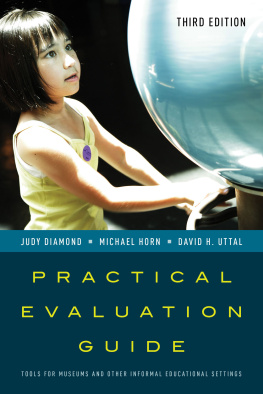

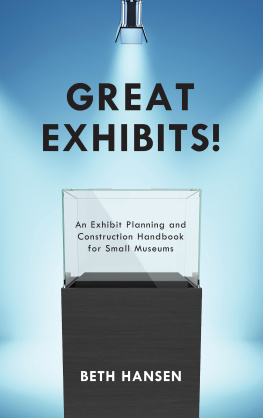
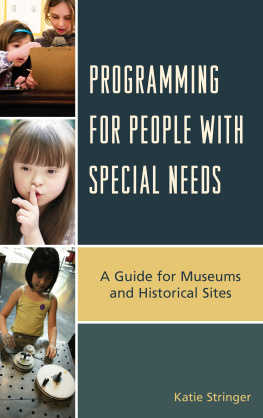
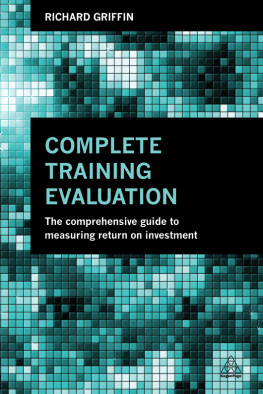
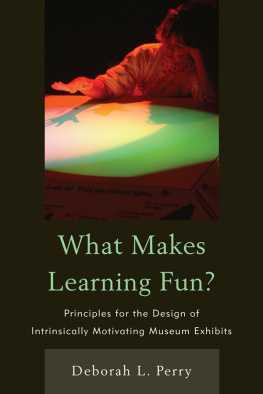
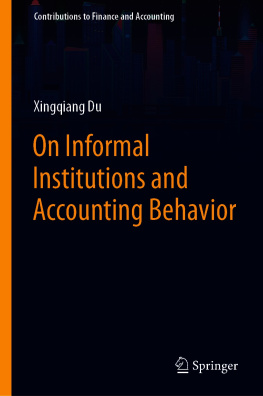
 The paper used in this publication meets the minimum requirements of American National Standard for Information SciencesPermanence of Paper for Printed Library Materials, ANSI/NISO Z39.48-1992.
The paper used in this publication meets the minimum requirements of American National Standard for Information SciencesPermanence of Paper for Printed Library Materials, ANSI/NISO Z39.48-1992.